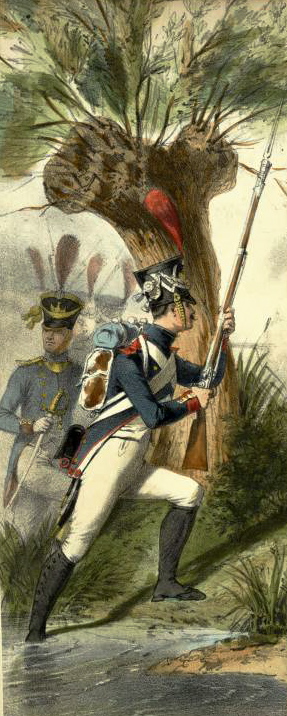Royal Fhainnin Army
The Royal Army of the Throne of the Fhainn, or the Royal Fhainnin Army, was the armed forces of the Kingdom of Fhainnlannachaeran from x to 1906.




infobox here
History
Formation
Thing Here
1791 Reforms
Shakos became the dominant headwear, while bearskin caps were reserved for cold-weather regiments; unlike most armies, the Royal army employed Grenadiers, typically associated with bearskin hats, as the first platoon of a regiment, equipping them similarly to the rest of the regiment with the exception of storming equipment and more elaborate trim.
Thing Here
Armies Fielded
Pre-date structure
post-date structure
30 men, one platoon (1 gun) 160 men, 5 platoons, one company (4 guns) 830 men, five companies, one battalion (20 guns) 2600 men, three battalions, one regiment (60 guns)
In addition, small-unit tactics were introduced with the formation of infantry platoons - units of thirty men, one of which was a sergeant, which acted as a fire group. An infantry platoon typically stood in three ranks; the first two would fire simultaneously with the first kneeling, followed by the second rank kneeling and reloading with the first rank while the third rank either fired or held in case of a charge at the discretion of the sergeant. Five platoons formed a company, which recieved a commanding officer with a command staff bearing a company command flag and instruments. When possible, three companies would be on the front at a given time, with two in reserve to move up and swap positions with badly damaged companies or counteract flanking attacks if the line was broken elsewhere.
Five 160-man companies would create a full battalion, which would deploy four companies at the front and one in reserve. A battalion would additionally have a command platoon. Three 830-man battalions would form the core of a regiment, with an additional 100+ supply, battalion medical, and other support personnel. Later additions would inflate the standard 2600-man regiment to roughtly 3,200 by 1906, with much of the additional burden of support being taken on by dedicated support regiments attached to a Command Group.
An Army Command Group would consist of anywhere from one to twelve regiments as a situation allowed or required; typically, an 1810-1830 Command Group would ideally field six infantry, two artillery, two cavalry, and one support regiments. This was rarely the case in practice, and in the 1870s-80s this ideal would be altered to a 4-4-2-2 ratio.
Artillery units fielded sixty guns apiece, with four out of every five platoons managing one gun. Individual artillery platoons handled their own ammunition and stores. Cavalry were organized similarly to infantry, but were allowed more local command; rather than battalions acting as the primary tactical unit, individual companies were allowed to pursue objectives at their officers' discretion in many cases. Cavalry primarily consisted of (name here), a light cavalry type wielding lances and sabers and covering roles generally reserved for hussars and lancers separately in other nations.
Royal Guard and Throneswatch
The Throneswatch, the secret police and operatives of the Fhainnin THrone, fielded military units of professional soldiers for much or the early history of the Royal Army and even prior to its formation. However, after the reforms, its military functions were split off into the Royal Guard. The Guard initally began as a single infantry regiment of elite troops, but eventually expanded to a total of four cavalry, three infantry, and a Guard supply unit by 1860. By the Second Kin War, the Guard was composed of three cavalry and the original infantry regiment, and Guard Cavalry earned a reputation as ruthless shock troops.
Royal Guard cavalry were outfitted as curiassiers, with heavy swords and breastplates until 1889. After 1863, they additionally carried pistols.